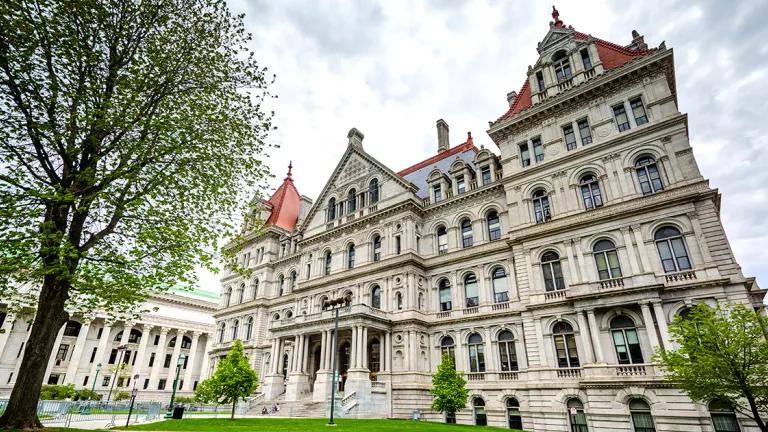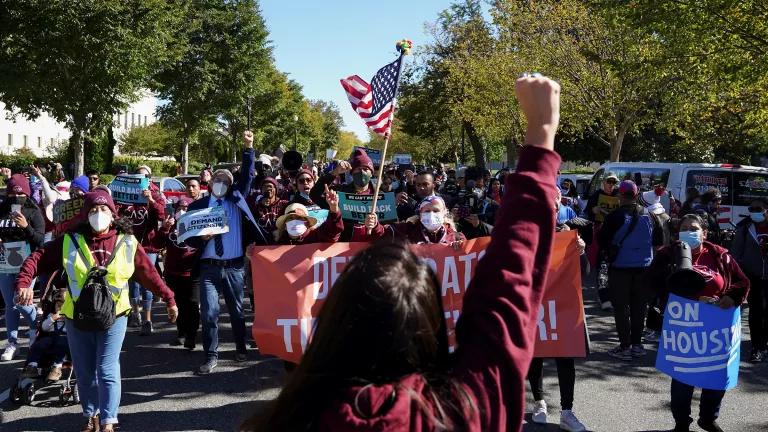Back to the Future: New Jersey Rejoins RGGI Climate Program

Photo: Person-with-No Name via Flickr/Creative Commons
New Jersey will soon breathe easier thanks to Governor Phil Murphy’s fulfillment of a major promise. In a final rule issued today, the state’s environmental agency has committed to rejoin the groundbreaking pollution-cutting program known as the Regional Greenhouse Gas Initiative or RGGI (“Reggie”) on January 1, 2020, after an eight-year hiatus.
Over the last decade, RGGI, a forward-thinking market-based program that facilitates the transition to clean electricity, has helped cut in half carbon pollution from power plants in Northeast and Mid-Atlantic states while generating billions of dollars in benefits.
Thanks to RGGI, the region’s air is cleaner, leading to thousands of fewer asthma attacks, hundreds of fewer premature deaths, and reductions in pollution-caused illnesses.
By helping secure the region’s clean energy future, RGGI has also boosted the economy by $4.3 billion, provided more than 44,000 new job-years of employment, and saved customers more than $900 million on their energy bills through investments in cost-saving energy efficiency and other clean energy programs.
Together with nine neighboring states—Connecticut, Delaware, Maine, Maryland, Massachusetts, New Hampshire, New York, Rhode Island, and Vermont—New Jersey helped launch RGGI in 2009.
Unfortunately, the state has largely missed out on RGGI’s benefits. That’s because in 2012, former governor Chris Christie turned back the clock by unilaterally—and illegally—withdrawing New Jersey from this incredibly successful program. In the process, he deprived New Jersey of cleaner air, new jobs, economic growth, and nearly $300 million in funding for clean energy.
In one of his first acts in office, Governor Murphy committed to reverse the prior administration’s reckless decision. Today’s rule follows through on that promise.
Under the rule, New Jersey will reduce climate-changing carbon pollution from power plants 30 percent by 2030, consistent with the trajectory agreed to by other RGGI states in 2017. The state will do so by setting an enforceable limit on carbon pollution that declines over time.
Because RGGI requires owners of fossil fuel-fired power plants to pay for their pollution, the program further generates hundreds of millions of dollars each year that states can invest in clean energy. New Jersey will share in these proceeds, and in the months ahead, state agencies will develop specific plans for investing New Jersey’s share of RGGI proceeds to maximize the program’s benefits and accelerate the clean energy transition statewide.
By rejoining RGGI, New Jersey is getting back on track and once again charting a better future for its citizens. Combined with last year’s legislation to quadruple energy efficiency and ensure half of New Jersey’s electricity comes from renewable energy by 2030 and Governor Murphy’s bold commitment to develop 3,500 MW of offshore wind by 2030, the state is cementing itself as a clean energy leader.
To address the climate crisis; however, we also need to tackle pollution beyond the power sector. In fact, the largest source of carbon pollution in New Jersey today is transportation. Cleaning up the pollution from cars, trucks, buses, and trains is a critical next step.
That’s why New Jersey is also working with its RGGI partners and other states in the region to develop a regional clean transportation policy that would accomplish for motor vehicles what RGGI is doing for power plants.
By continuing to work with partners regionally while making progress in state, Governor Murphy can continue to chart a cleaner, more sustainable future for New Jersey.



